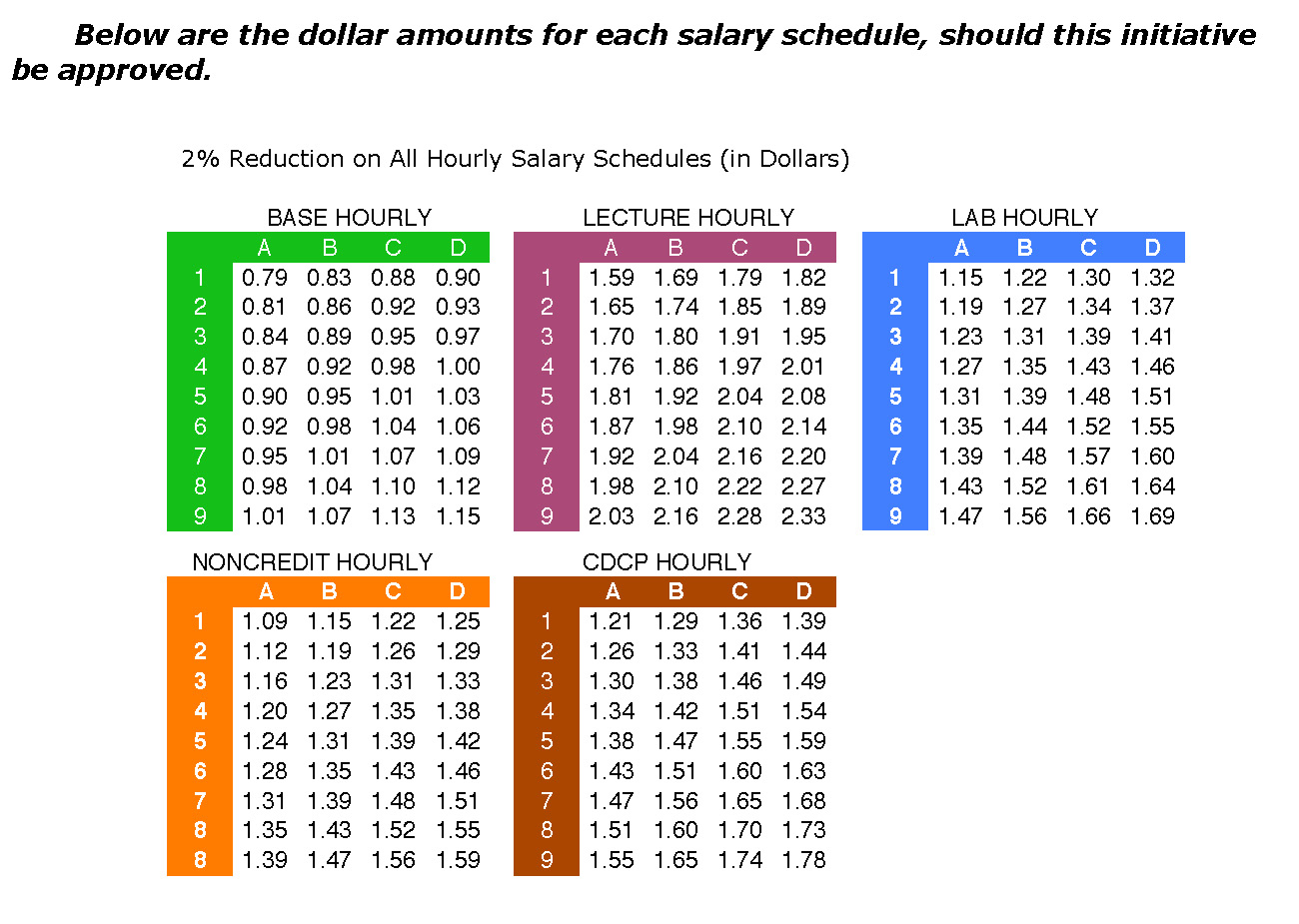|
|
 |
 |
 |
 |
 |
 |
 |
 |
 |

Your Official Communication Channel - Sign up Here |
|
| |
|
|
| |
|
|
| |
|
|
|
|
|
Adjunct Medical Benefits Program Initiative Results
The ballots have been tallied for the Adjunct Medical Benefits Program Initiative. Here are the final results:
YES |
147 |
86.0% |
NO |
24 |
14.0% |
total |
171 |
100.0% |
Adjunct Faculty Medical Benefits Program Initiative
To provide ongoing funding for the Adjunct Medical Benefits Program, hourly faculty salaries
(adjunct and overload) should be reduced by no more than two percent. This two percent
reduction would be ongoing, and over and above the current 0.565% reduction and whatever
reduction to the enhanced salary schedules occurs due to state categorical program cuts.
A. Yes B. No |
The Issue:
Two weeks ago, regular and adjunct faculty members were asked whether they would
take an ongoing one percent salary reduction to provide funding for the Adjunct Faculty
Medical Benefits Program (AMBP). The AFA Executive Council decided that each group would
have to agree to this salary reduction in order for the negotiating team to move ahead with
redirecting this money to funding the AMBP. The adjunct faculty approved the measure (Yes
62.5%/No 37.5%), but the regular faculty did not (Yes 27.5% / No 72.5%). The aggregate vote
was Yes 48.5% and No 51.5%.
Approving this current initiative would help sustain the AMBP on an ongoing basis by
reducing hourly salaries equally by two percent; however, if the adjunct faculty does not vote to
take an ongoing two percent salary reduction, then the District will most likely eliminate the
AMBP, effective October 2010. Note: Should the current initiative pass, the two percent salary
reduction would not begin earlier than Summer 2010.
Over each semester of the past nine years, approximately two hundred SRJC adjunct
faculty members and their eligible dependents have participated in the program. If and when
federal health care reform is implemented, the program may become less crucial, but at this
time the SRJC AMBP provides a necessary safety net for our colleagues and their families.
Adjunct faculty will also be facing salary reductions as a result of the 62% cuts to fundingof state categorical programs for part-time office hours and part-time parity pay (as will
regular faculty teaching overloads). These categorical program cuts possibly will be only for
the duration of the state budget emergency. In contrast, any salary reduction that helps to
sustain the AMBP will be in place until other options for quality medical insurance are
available.
Background:
The District enrolled the state’s Adjunct Medical Benefit Program (AMBP) in Fall 2000. The
program resulted from legislative action that set aside $1 million each year in state categorical
program funds to pay the cost of medical benefit premiums for part-time instructors in the
State’s community colleges. Participating faculty members are required to maintain a 40%
load average over an academic year (summer included) and pay 50% of their medical
premiums to the District. Adjunct faculty members are offered a choice between the two
District-sponsored group plans. Last year the District tightened the eligibility criteria, while
remaining in compliance with the broader guidelines set by the State.
The intent of the legislation was that districts would apply to the State for reimbursement
of the remaining 50% of the premium, the portion not paid for by the faculty member. In the
first year of the program, the $1 million was sufficient to reimburse the participating districts
almost the full 50%. However, over the years, as participation has increased along with
premium costs, the State has responded by decreasing the level of reimbursement to all
districts. Before this year’s budget reduction, the State was returning approximately 13 cents
on the dollar to SRJC. Funding of this categorical program was further cut during the current
budget crisis to approximately eight cents on the dollar.
The total annual cost of the program is approximately $1.1 million, with half of that
revenue coming from the participating faculty. The District has maintained adherence to the
original negotiated agreement about the program (i.e., there would be no cost to the District
other than administrative overhead costs). The Board of Trustees has refused to fund any
portion of the AMBP premiums on an ongoing basis, and there has been no shift in this
position over the last several years. In order to maintain the program in the face of steadily
decreasing state reimbursement levels and dramatically increasing medical benefit costs, AFA
has negotiated with the District each year to redirect funds from other sources (including the
Adjunct Faculty District Activities Fund, the Sabbatical Leave Program, and COLA). These
alternatives are now exhausted.
/Contract/Articles/art10.pdf
Contract/MOU/mou_10_benefits.pdf
Contract/MOU/mou_25_sabb.pdf
Discussion
Read the comments of your colleagues at Fa09Referendum.shtml.
You may contribute to this discussion by emailing your comments to afa@santarosa.edu
using your College email and SUBJECT: Referendum
 |
| |
|
|
|